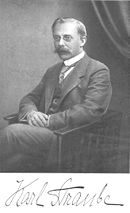Church Music Institute (Leipzig)
The Church Music Institute is a traditional training center for church musicians in Leipzig , which served as a model for several church music institutes in Germany.
history
After the Leipzig Conservatory was founded in 1843 , Carl Ferdinand Becker , the organist at the Nikolaikirche at the time , became the first university lecturer for the liturgical organ in Leipzig. At the suggestion of Carl Piutti, one of his successors, and Paul Röntgensch, the Saxon King Albert in 1900 and the Board of Directors of the Conservatory in 1901 approved the establishment of a school for organists . In 1907 the organist of the St. Thomas Church Karl Straube became a university professor. Him as Bach and Reger Kenner owes the institution theLeipzig organ school . After the First World War , the conservatories in Dresden and Leipzig were in great competition for the establishment of a church music institute in Saxony . The Institute for Church Music at the Conservatory of Music in Leipzig was actually founded in 1921. Günther Ramin , Johannes Wolgast , Fritz Reuter , Carl Adolf Martienssen and Emil Paul were among the staff from the very beginning . Due to the German inflation from 1914 to 1923 , the Conservatory and the institute were in enormous financial distress. Cost-saving measures called for the conversion of the new facility into a church music department. Thanks to the influence of the Evangelical Lutheran Regional Church of Saxony , a new church music institute was established under its leadership in 1926. In 1927 the conservatory, today the "Felix Mendelssohn Bartholdy" University of Music and Theater in Leipzig , acquired a Sauer organ . Wolgast established the publication of piano and organ works by Georg Böhm at the institute. Kurt Thomas founded the Kantorei, a choir of music students. The choir gained national renown . In the 1930s there were now one hundred and forty students enrolled.
National Socialism
In the Third Reich , several lecturers were dismissed for political and racist reasons, according to Günter Raphael . The Berliner Musikakademie tried to poach the heads of the Leipzig institute. Thomas and Martienssen followed the call to Berlin . Johann Nepomuk David filled the vacant position. In addition to the Protestant church education, Catholic church music became a subject in 1936 . Georg Trexler became the first lecturer. Some university professors were instrumentalized by the NSDAP , for example Ramin performed musically at the Nuremberg Rally in 1936. As a result, the institution's independence was increasingly questioned. In 1943 it was renamed the Institute for Church Music with the prospect of being fully integrated into the university. The artistic endeavors of the institute were destroyed with the air raids on Leipzig , because the property had to be evacuated.
German Democratic Republic
Karl Straube re- founded the Church Music Institute . Heinrich Fleischer and Robert Köbler were among the first university teachers. In fact, the institute was just a department of the University of Music. Despite his past, Ramin became the leader in 1950. Several lecturers, including Fleischer, Karl Richter and Diethard Hellmann , fled to West Germany . The building of the wall also prevented an intensive academic exchange with West German music academies. The church music training ended with the A-exam , which the church continued to regard as a meaningful conclusion. In 1960 the institute was integrated into the keyboard instruments department, specializing in organ and harpsichord, as the University Church of St. Pauli was blown up and as part of the GDR ideology. Finally in 1984 the office of Thomaskantor was separated from the professorship at the institute.
Since the reunification
In 1992, Christoph Krummacher was commissioned to restore the actual institute, which was brought into being in the same year as the church music institute of the "Felix Mendelssohn Bartholdy" University of Music and Theater in Leipzig . Arvid Gast and Roland Börger filled the first professorships. In 1998 the institute bought an organ from Patrick Collin from Belgium . Today the institute belongs to Faculty III of the university. The director has been Prof. Dr. Krummacher. A total of 13 university professors train the students in church music , choir and ensemble conducting and organ.
literature
- Maren Goltz: The Church Music Institute. Traces of an eventful history . Leipzig 2001, ISBN 3-930550-16-4
Individual evidence
- ↑ University of Music Heidelberg ( Memento of the original from July 19, 2011 in the Internet Archive ) Info: The archive link was inserted automatically and has not yet been checked. Please check the original and archive link according to the instructions and then remove this notice.
- ^ Maren Goltz: The Church Music Institute. Traces of an eventful history. Leipzig 2001, p. 4.

